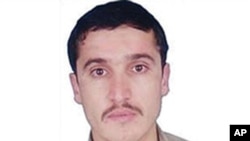U.S. officials have confirmed that al Qaida's second in command, Atiyah Abd al-Rahman was killed in a drone attack in the Waziristan region of Pakistan. Referred to by one official as a "human Rolodex," the Libyan-born al-Rahman had, according to terrorism analysts, served as a major link between al Qaida in Pakistan and its affiliates abroad, and had become increasingly involved in operational planning. Al-Rahman rose to second in command under Ayman al-Zawahiri in the wake of Usama bin Laden's death.
US Deputy National Security Advisor John Brennan told the Associated Press that al-Rahman's death was a "huge blow" and that al Qaida is "on a steady slide" since the August 22nd strike.
A U.S. counterterrorism official told Voice of America that the cumulative effect of al-Rahman's death on al Qaida in Pakistan is "tremendous." The official said al-Rahman's death adds to the disruption and confusion within al-Qaida.
The strike against al-Rahman takes the U.S. one step further in a concerted effort "to disrupt, dismantle and defeat al-Qaida," as called for by President Barack Obama. Brennan noted, however, that now is not the time to "step back and let them recover."
In an August 16th discussion at the National Defense University, Secretary of Defense Leon Panetta noted the importance of keeping up pressure on the al-Qaida leadership in Pakistan: "We are going after those who continue to plan to attack this country," said Secretary Panetta.
"They’re terrorists. And the operations that we’ve conducted there have been very effective at undermining al-Qaida and their ability to plan those kinds of attacks. … By weakening their leadership, we will undermine al-Qaida’s ability to ultimately put together that universal jihad that they’ve always tried to put together in order to conduct attacks on this country.
"There’s more to be done," said Secretary Panetta, noting the spread of "nodes" of al Qaida in Yemen, Somalia and other areas. "But, he said, "I think we are on the path to … seriously weakening al-Qaida as a threat to this country."




